When sports practices were abruptly canceled at his school on March 12, 2020, Michael Liao, then 17, started to worry how much the pandemic would affect his school – and particularly his upcoming theater performance. The next morning, he woke to an email announcing that in-person classes would be canceled for the foreseeable future.

By mid-April, the world had changed.
Jaden Huynh, then 16 and a sophomore at Arvada West High School in a suburb northwest of Denver, circled the dinner table plating goi — a Vietnamese salad — and spring rolls for her family’s Easter dinner and silently counted all the empty seats for cousins and extended relatives.
Colorado’s lockdown had been in place for months when Michael’s classmate, Mana Setayesh, also 17 at the time and a rising senior at Peak to Peak Charter School in Lafayette, sat stunned when her doctor told her a high school swimming star had come down with Covid-19 and could no longer attend college.
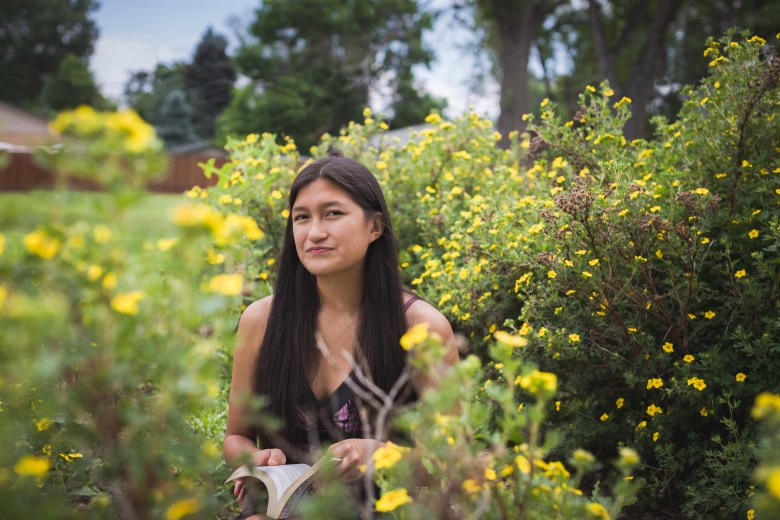
Jaden Huynh 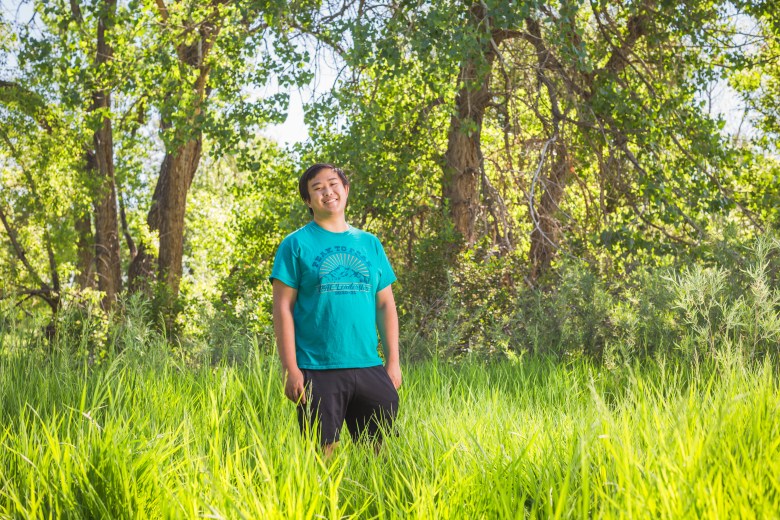
Michael Liao 
Mana Setayesh
All three planned to graduate at the end of the 2020-21 school year. But as spring turned to summer and the pandemic raged, unabated, each quietly realized their senior year could end far differently than they ever expected. The months of disruption continued for Michael, Jaden, Mana and the other 3.7 million teenagers preparing for a triumphant final year of high school. And it gradually became clear to all of them: The timing of this global pandemic mattered.
“You don’t get a second chance at 12th grade,” Michael said. “This is it. This is the hand we were dealt.”
Stuck at home, these students saw their future threatened by an unpredictable and deadly virus that upended the economy and possibly their hopes for college. They watched as the police murder of an unarmed Black man reignited the country’s fight for racial and social justice. And they lived through perhaps the most divisive presidential battle in American history, culminating in rioters storming the Capitol in Washington, D.C. This chaotic year is now the foundation for these young people’s transition to adulthood.
Fall
In late October, as a cold front plunged Denver into near-freezing temperatures, Jaden walked through Arvada West on one of the two days each week she attended class in person as part of the school’s hybrid schedule.
Public health officials had opened an investigation into her school for a Covid-19 outbreak just days earlier, but the hybrid schedule remained, offering Jaden the chance to meet with her English teacher for help with an essay. But the conversation soon turned, as it often did with this teacher, to Jaden’s hope of to graduating early. The teenager left the classroom feeling her teacher was “super against” her plans.
“Graduating early during a pandemic is going to be incredibly difficult,” Jaden said. “It threw a huge fork into my plans.”
3.7 million teenagers were set to graduate from high school in spring 2021
She had just applied for a full-ride scholarship that she hoped would start her on the long path to becoming a neurosurgeon. The scholarship, from the Boettcher Foundation, would pay her way to one of 16 four-year universities in Colorado, something her family could never afford without taking on debt. (She previously wanted to specialize in trauma surgery but eventually decided to avoid “the terrible rates of PTSD” in that field and instead learn how to cut into people’s brains.)
“I’ve always been obsessed with the brain,” said Jaden.
Jaden bristled at the suggestion that she reconsider her early graduation goal. She was ready to start her adult life, one she hoped would allow her to support her family. Her father lost work during the pandemic, putting the family of 14 back on food stamps and Medicaid. Jaden is the third oldest in her family and dotes on her many younger siblings, some of whom are adopted.
Related: Pandemic reduces number of high school students taking dual enrollment courses
But learning from home was hard and her slipping grades threatened her plans.
“I set deadlines for myself, but it’s hard with how many people I live with,” Jaden said in early November. “You can’t ask teachers for a later due date. They’re slammed too.”
“I’m so tired of historical things happening.”
Michael Liao
She had enrolled in nine classes to earn all the necessary credits to graduate by May. Even with a personal hotspot from the school, Jaden grew frustrated with spotty Wi-Fi during remote classes. A chemistry teacher warned that missing Zoom classes, for any reason, would result in missing credit. Meeting these requirements became even harder isolated from the supports she used to rely on. Jaden, who identifies as Hispanic, Indigenous and Vietnamese, especially missed her mentors — including a favorite teacher who quit and moved across the country mid-year and the school counselor who had been available for drop-in meetings on campus before the pandemic.
Across the U.S., learning loss during the pandemic hit children living in poverty and students of color particularly hard. Early data suggested about a third of low-income, Black and Hispanic students did not regularly log into online instruction. But despite her own challenges with remote learning, Jaden was not ready to give up.
“When I commit to something, I commit, but I’m also bound to fail at times,” she said. On her college essays, she underscored the value of resilience. One began: “I’m really good at failing.”
“It was supposed to be a hook,” she explained. Rebounding from small failures, she believed, would lead to long-term success, no matter the hurdles in her way. “I really have to kick up and dig in and dig deep if I really want this,” she said.
About 20 minutes away, in Boulder, Mana was also thinking about college.
She had entered Peak to Peak, a college prep program, as a sixth grader and never doubted her plans to apply to top tier schools after graduation. But from her bedroom — decorated with new art she painted during lockdown and a puzzle poster of the periodic table of elements — Mana began rethinking her timing once she heard from friends in the Class of 2020.
“Your whole life builds up to this point, and then it’s just nonexistent.”
Mana Setayesh
They shared horror stories of dorm life during a pandemic. One remained stuck in her room alone, with only three other people on the same floor and classes completely online. Prepackaged food was delivered to another friend in a similar set up.
“They’re basically paying money to sit in a tiny square room, not allowed to come out and no one to talk to,” Mana said. “Wouldn’t it be better to stay at home with my family?”
Related: Opening the doors to elite public schools
Mana also refined her baking skills — she tested recipes from Iran, the country her parents had emigrated from — watched movies outdoors with friends and spent time on her bed scrolling through news reports about the record number of applications to, and record low acceptance rates at, elite colleges. The pandemic also prompted many incoming freshmen to delay their enrollment for a year; many universities stopped requiring the ACT or SAT for admission.
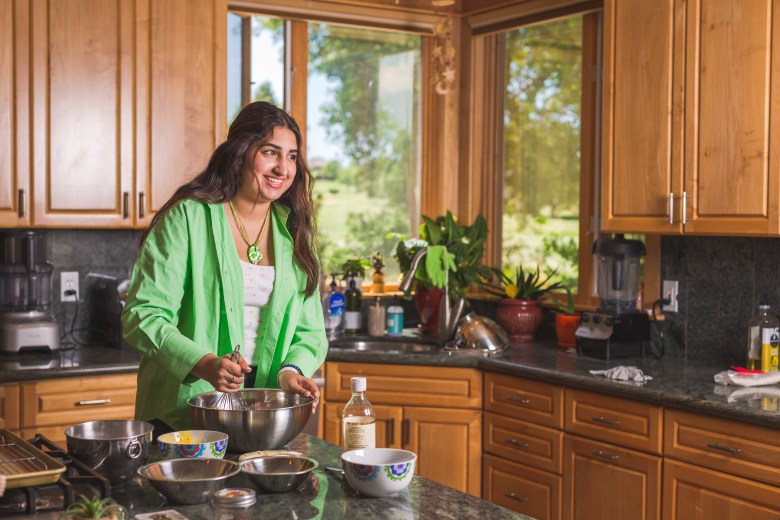
“You don’t want to get your hopes up, especially this year,” Mana said. After years of hard work aimed at being academically prepared for a school like Stanford University, her first choice, it suddenly felt like “there was just no way I was getting in.”
She knew she’d go to college somewhere. “I just started wondering what that would look like,” she said. “Would I enjoy freshman year? Should I defer it?”
Michael, the oldest son of Chinese immigrants, was also busy with college and scholarship applications. He debated whether to prioritize liberal arts schools, where he could major in the humanities, or more research-focused universities, which his dad preferred. At least the applications offered a distraction from what he described as the “collective national trauma” of the ongoing pandemic.
Of the 56 schools in the Boulder Valley School District, Peak to Peak, where he and Mana were enrolled, was the only one to remain fully remote for most grades last fall. Michael tried to find humor and happiness in the absurdity of it all. Of PE on Zoom — “Oh, cool, I get to watch myself work out now.” Of teachers’ (animal) pet cameos — “A shot of dopamine.”
Michael sat alone in his room one day in October and recorded a violin piece. “Ugh, this is terrible,” he thought as he submitted the clip. The final performance — clipped together by his teacher from student submissions — made him feel better.
“The comfort I took in helping to create a small ensemble piece, regardless of how terrible it was performed, was not insignificant,” Michael said. (Of his own contribution — “I’m not as bad as I thought.”)
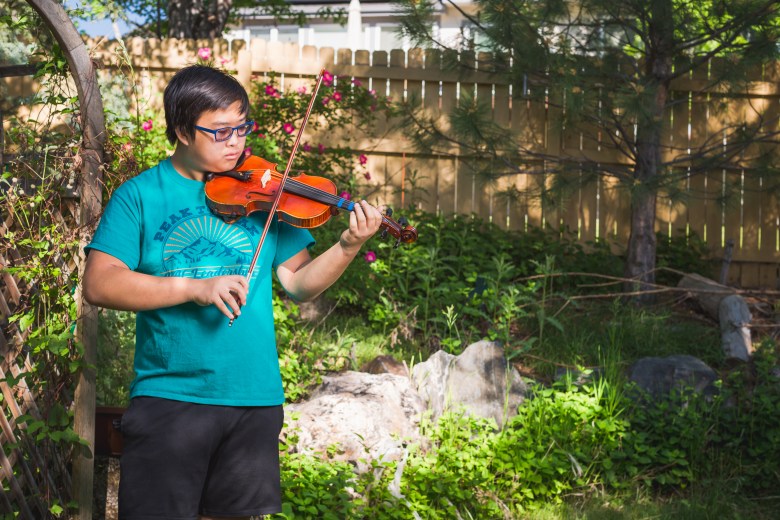
He craved playing with others in real time though. During a second quarter break, the teacher offered optional Zoom sessions on Fridays, so students wouldn’t get rusty. Michael was the only one to show.
“This is not what anyone asked for, but we’re still here, and we’re all working to make sure it’s as pain free as it can be,” he said, determined at that point in the fall to maintain his optimism. “Seeing the kind of grace that teachers offer to students, it’s really heartening. It allows me to appreciate they’re in this too.”
Related: Nation’s skeletal school mental health network will be severely tested
But as winter came on, Michael began to feel lonely and had a harder time staying optimistic. In a national poll, nearly three-quarters of the more than 2,400 high schoolers surveyed reported a poor or declining sense of mental health, with disproportionately high numbers of female and Hispanic students and students experiencing food insecurity reporting such problems. More than a year into the pandemic, the Children’s Hospital Colorado eventually declared a pediatric mental health state of emergency, as youth behavioral visits to the medical system’s emergency rooms increased more than 70 percent over early 2019.
Winter
Mana struggled with health issues of her own.
Back in December 2019, as news first started trickling in from China about a new highly infectious virus, Mana had awoken with sudden hearing loss in her left ear — her doctors were unable to explain why.
Her mother was determined to help her find a solution. She consulted experts in the United States, at the Mayo Clinic and Dartmouth University, and expanded her search for information to specialists in Iran and the United Kingdom. None of the experts were forthcoming. After a particularly disappointing appointment — her mom burst into tears of frustration, Mana burst into laughter from exhaustion — the pair visited a fortune teller to lift their spirits. Surrounded by incense smoke and Buddhist statues, the medium told the teenager to expect good news on Dec. 13, 2020 (although she failed to predict the pandemic).
“I just want to get out, not in a bad way. I just need to explore and make up for lost time.”
Mana Setayesh
Even with all the distractions — the dramatic presidential election, a third wave of Covid cases after Thanksgiving — the date stayed in Mana’s mind throughout the winter. And two days before Dec. 13, in between errands she was running for her quarantined grandmother, an email arrived from Stanford University.
It was a rejection letter.
She did get some good news on Dec. 13 though. Her hearing had recovered to 60 percent, the most it likely would. Sitting with the fortune teller nearly a year earlier, it never crossed her mind that the “good news” predicted could be merely a partial recovery of her hearing. But she was OK with it.
Related: ‘Right now is not my time’: How Covid dimmed college prospects for students who need help most
“With college, I have no gut feeling of where I’m going,” she said a few days later. But the hearing issue, she added, made her feel less pressured about the rejection. “Being in the present and being isolated made me realize that Stanford was everyone else’s dream for me … I knew this wasn’t meant for me, but I had no idea what else was. That’s pretty scary.”
Still, at the moment she received the rejection note, her whole future seemed hazy. And after losing out on key senior milestones she had anticipated since sixth grade, Mana continued to wonder whether taking a gap year would be best.
“It’s a pretty big deal,” she said. “Your whole life builds up to this point, and then it’s just nonexistent.”
Michael started hearing from schools too and received early acceptances from three.
The congratulatory letters included an initial estimate of his financial aid awards, and the offer of full-ride scholarships from Centre College, a private liberal arts school in Kentucky, and the University of Texas-Dallas left Michael pleased with himself. “It’s a good mood booster, when you’re starting to feel burned out,” he said in December.
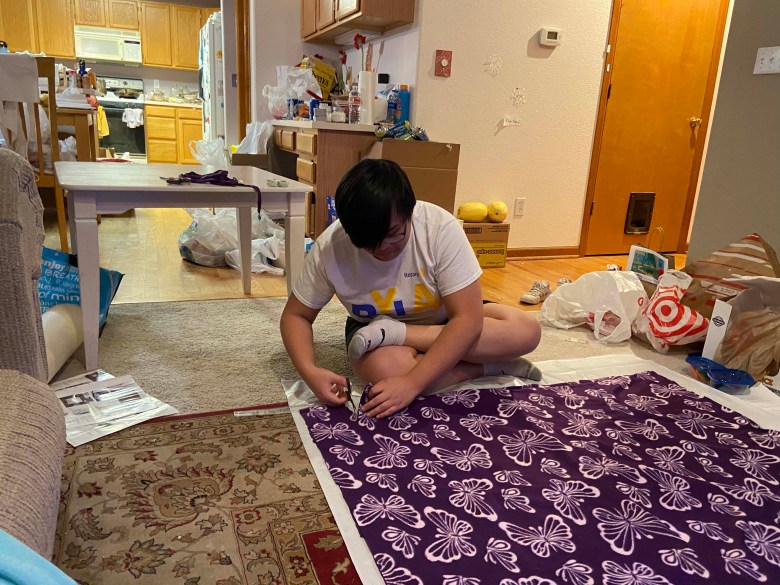
Even as record-setting warmth melted most of the snow during the holidays, the winter surge of coronavirus cases in Colorado kept Jaden at home for her 17th birthday, on New Year’s Day.
Jaden’s family typically celebrates with some Ecuadorian friends, who burn in effigy a representation of something bad (or annoying) from the old year. But this year, Jaden joined the family friends on Zoom for the midnight countdown.
Eating vanilla cake in her room, Jaden watched shaky video of the father of the other family hanging a large paper ball, surrounded by a cluster of crowns — a portrayal of the coronavirus — from a tree in the yard. At the stroke of midnight, in keeping with the Ecuadorian New Year tradition, the dad set fire to the effigy of Covid-19.
“I spent this entire year in a constant state of I-don’t-knows.”
Jaden Huynh
“That’s the entity that we would be better off without,” Jaden said in January 2021. “Maybe this year, we won’t get rid of [Covid] but we can handle it better after burning its spirit.”
A couple weeks later, her mom was sidelined by health issues, forcing Jaden to put school aside to help her family.
Jaden began to set her alarm for about 4:00 each morning. She’d spend a few pre-dawn hours on homework before waking her younger siblings and preparing breakfasts of cereal, pancakes or ramen noodles. Chores came next: mopping, sweeping, laundry and helping her 5-, 7- and 9-year-old siblings with homework each afternoon. At night, she cajoled the kids into showers before trying to tackle more homework and finally collapsing into bed herself before 11.
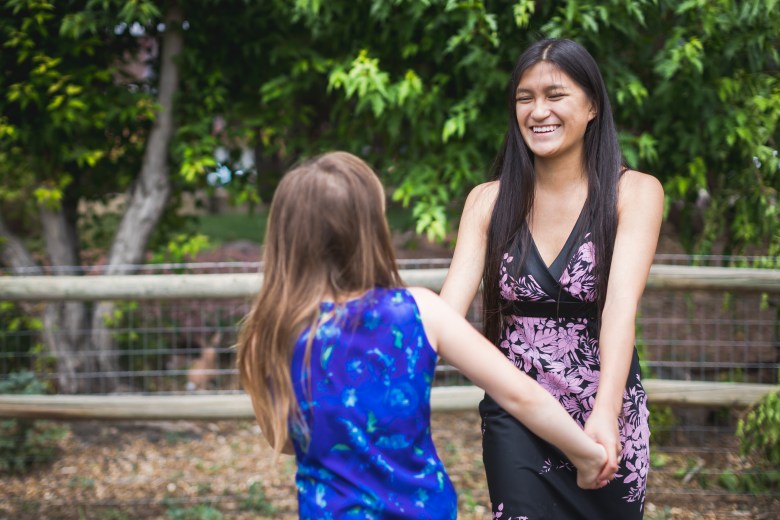
Joining many of her peers across the country, Jaden dutifully accepted the role of back-up parent, even as her frequent absences and missing assignments further threatened her early graduation plans.
“I was faced with having to step up for my family or for my education, and I chose my family,” Jaden said.
In early January, Michael got little work done as he watched the storming of the Capitol on TV with his family. Of the seemingly never-ending news cycle — “I’m so tired of historical things happening.”
But even when he avoided watching the news, he faced stress at home. His father had a chronic lung condition that made it risky to interact with anyone outside their family. In between driving his mother to work at the university and picking her up later in the day, Michael busied himself with chores at his family’s rental property: shoveling the driveway, fixing a broken toilet and shutting off all the outdoor plumbing so the pipes wouldn’t burst. He stayed on top of his academics, but slowly lost interest in things he usually enjoyed, like Dungeons & Dragons online. He skipped Among Us parties — an online game that requires players to guess the identity of an assassin — arranged by the student council.
“The burnout is real,” he said in February. “I haven’t really socialized ever since cases started rising again.”
One morning, he got a text message from a friend, asking him to visit the coffee shop where his friend worked. His parents had reservations, but Michael hadn’t seen his friend since July, during a physically distanced farewell for theater kids heading to college.
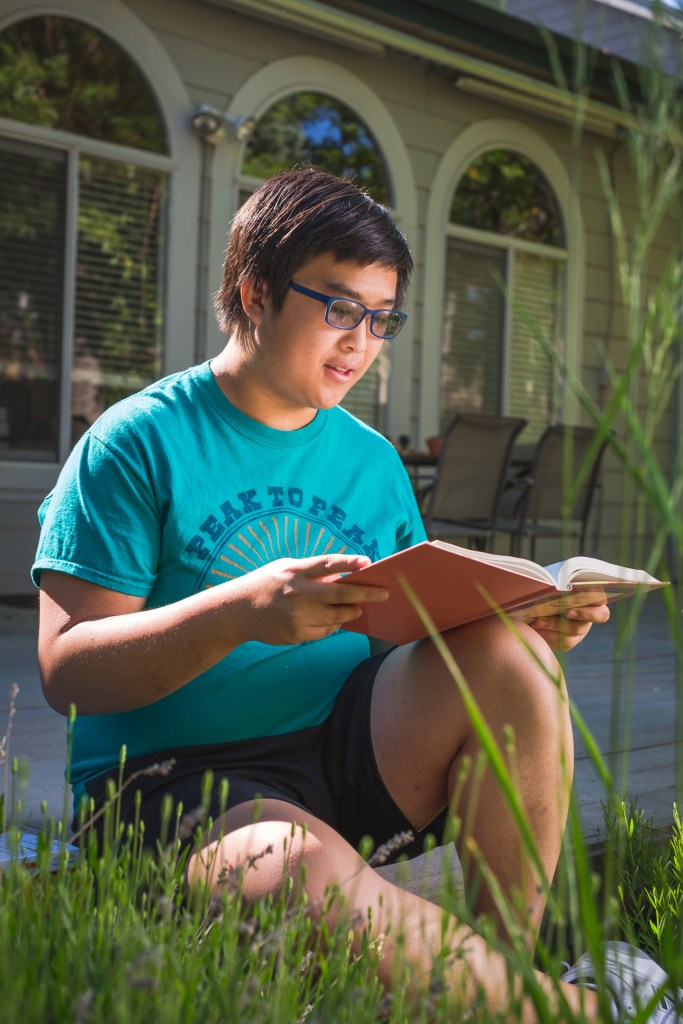
With hefty textbooks in his arms, Michael nervously walked into the café and looked for his friend; whose bright shock of red hair behind the counter was like a friendly wave. Michael cleared a seat nearby, ordered a small drink and lifted his mask to take quick sips while eavesdropping on the surrounding customers.
“It was mostly about basking in the presence of other people. There’s something about that ambience that I didn’t know I missed,” Michael said. He also got a hug — an unexpected embrace in the parking lot — “which is wild, considering I don’t do that very often, even in normal times.”
The isolation, he realized later, had changed him: “I have been incredibly touch-starved.”
Related: PROOF POINTS: Depression and anxiety rise among Chinese teens during coronavirus pandemic
The restrictions of the pandemic had a significant impact on young people, who rely heavily on social connections for emotional support, according to a March 2021 survey from the University of Michigan’s C.S. Mott Children’s Hospital. About three quarters of the parents who responded said the pandemic had a negative impact on their teens’ ability to interact with friends. That held true for Michael, but therapy helped him understand the importance of human relationships.
“I find it hard to be vulnerable, and this simple act of giving a hug recognizes that person means something to you.” He’d been, he realized, “a bit of a coward in that department — until Covid hit.”
Spring
For Jaden, the anxiety continued into April, as she waited to learn if she had won the full-ride scholarship. Then, days after Colorado opened vaccine eligibility to anyone 16 or older, both her mom and dad tested positive for Covid. The diagnosis meant Jaden was back to playing back-up mom.
“I can’t afford to be a kid anymore,” she said. “I have obligations and people I need to support. I don’t have time to hang out with friends or go to a dance.”
“I was faced with having to step up for my family or for my education, and I chose my family.”
Jaden Huynh
After her parents’ recovery, Jaden sat on her bed and tried to complete yet another overdue English essay. The constant patter of her younger sister running up and down the stairs — relaying reminders from their mom that Jaden needed to scrub the kitchen counters — tested her patience and concentration.
By that point, she had considered staying at a friend’s house for some peace and quiet. Her mother rejected the request and Jaden began to lose faith that she could ever improve her failing grades. That morning, she’d had enough.
“I couldn’t stop yelling,” she said. “I needed to just be left alone. I felt so sick. I could never choose school over family, but school used to be everything to me.”
Mana and her parents, meanwhile, were fully vaccinated by April. In between hugging friends for the first time in a year and planning for actual college visits, Mana allowed herself to start imagining a future that looked more like the one she’d had in mind for years.
The arrival of acceptance letters from five schools — mostly her backup choices — made that seem even more likely.
“I want to do every single thing I can possibly do,” Mana said. “I just want to get out, not in a bad way. I just need to explore and make up for lost time.”
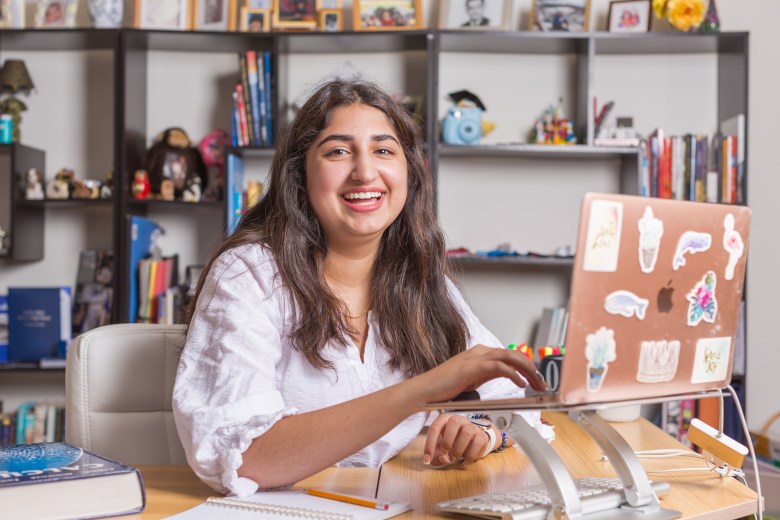
And as her goal of going to college has held steady, her list of what she hopes to accomplish during her first year has changed. “It was never on my freshman bucket list to visit every restaurant in town,” Mana said. “Now I’m going try every single one that sounds remotely good.”
As rained soaked the Boulder Valley in spring, the future began to look less grim. Mana got to ditch the weather — and Zoom — for in-person college visits at her three preferred schools in California. Peak to Peak announced tentative plans for an actual prom — the state would limit students to dancing in pods of 10 people or less — and an outdoor graduation ceremony.
At her desk, sitting among Harry Potter books and souvenirs from previous travels with her parents, Mana created a balance sheet to account for her final year of high school. Among the losses: Volleyball tournaments. Homecoming. A final ski season with her dad. Gains: Increased independence. A stronger sense of self. More time with her family.
“We had meals together every single day. We used to only do that on weekends,” Mana said. “It’s been a blessing especially because it’s my last year at home. A lot of times, most students pack their last year and it’s so busy and hectic, they lose out on that.”
By the final quarter of school, as vaccines allowed Peak to Peak to open its doors to in-person learning again, Michael’s father also got his first shot and traveled to California to visit with Michael’s older sister. While he was out of town, Michael’s mother decided to send Michael and his brothers back to class.
“We just show up, I open my computer and do what I would be doing at home,” Michael said of that first week. “I haven’t seen someone sit next to me for a very long time. It’s glorious.”
Related: Schools use art to help kids through trauma
But after dinner one evening, as he was about to step into the shower, Michael’s phone rang. It was his father, demanding to know why he went back to school. Halfway undressed, Michael told him to figure it out with his mom, and by the time he showered and dressed again, the mandate was set: He’d finish the year entirely from home.
Disheartened, but understanding, Michael had one lifeline that his brothers didn’t: Theater rehearsals had started again and he was allowed to go.
“You don’t get a second chance at 12th grade.”
Michael Liao
For a two-night, outdoor performance of “Matilda,” the cast started each rehearsal in a big circle.
Tongue twisters in a British accent made Michael chuckle during the vocal warmups, and transparent face masks made it easier to see his fellow actors’ smiles.
Before the closing performance, he and the other seniors gathered for the “tradition of shroses” — each held a bundle of fake roses for each show they had joined since freshman year. Michael, with “a dinky four flowers,” fought back tears as his castmates gushed about their adopted family.
“They’re all kinda wacky, and I mean that in the most endearing way. We’re all a group of misfits,” he said. “I wish I had joined theater sooner.”
Getting back to theater was “a benchmark” for Michael. “Before, I was unhappy … At least now I’m sad with friends,” he joked.
Graduation
By May, when more than 40 percent of Coloradans had received their full vaccinations, Jaden was still waiting for a shot. But she had other priorities in mind: With the support and understanding of her teachers, who bent a few rules — and some wrangling by her college counselor — Jaden got the go-ahead to finish her remaining credits over the summer and graduate a year early as planned. The scholarship foundation also announced her as a full finalist, solidifying her intent to attend the University of Colorado Denver this fall.
The 17-year-old didn’t walk with seniors at Arvada West, although she had never really expected to don a cap and gown to mark the end of her time in high school. But while she didn’t mind ditching the ceremony, Jaden was sorry she’d missed the last chance to see her teachers and counselors; she knew she wouldn’t have reached the finish line without them.
“I spent this entire year in a constant state of I-don’t-knows,” she said. “Obstacles were thrown at me left and right, and I took on more responsibility than I thought I could bear.”
Jaden said surviving the year wasn’t easy, but believes it was the perfect preparation for an early entry into college. She no longer fears asking for help.
“Putting a lot on yourself is super difficult, but not impossible, if you involve other people,” Jaden said. “The more I rely on others, the less difficult a load becomes.”
Early in May, Mana sat on the living room couch and opened her phone, expecting bad news. “Let’s just open them,” she told her mother of the application status updates from the two Ivy League schools at the top of her list. “If I didn’t get in, it’s fine. Let’s move on.”
She got in.
“I was like, ‘Waiiiiiit a second. Hold on. Did I get in? I don’t know if this is true!’” Mana recalled. “We called my dad over and he was like, ‘What! You got in?’ It was just a lot of excitement and surprise and so much after an application cycle that has been so insane and crazy.”
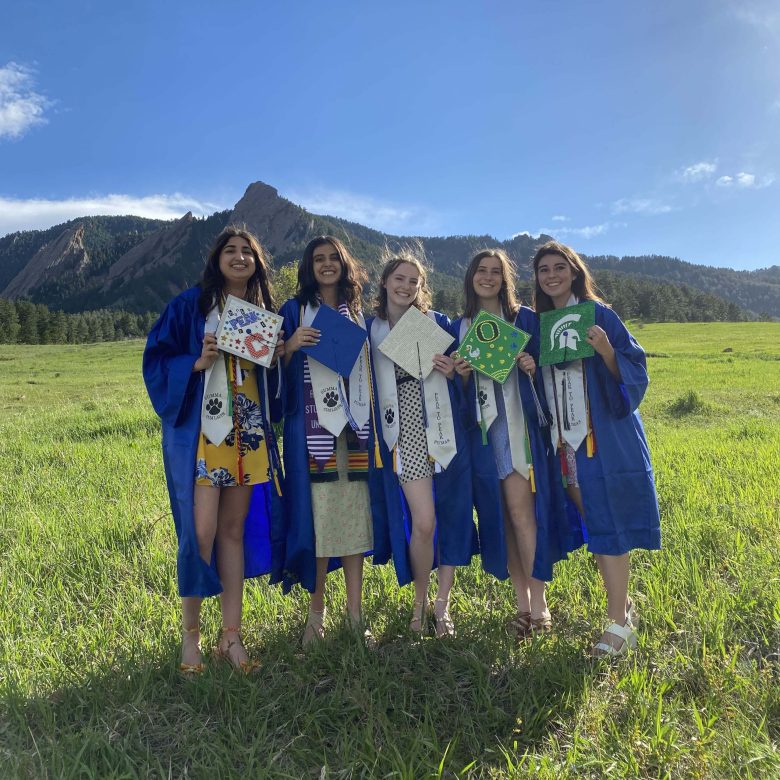
Mana plans to study biotechnology at Cornell University and hopes to pursue it further in graduate school.
She recently picked up her diploma from Peak to Peak and spent time visiting with teachers she hadn’t seen in a year and others she just hadn’t had the chance to say goodbye to before the school year ended for seniors on May 19.
“No one has to be as flexible or as overcoming or as persevering as we have,” Mana said of her graduating class, both at Peak to Peak and nationally.
Michael, meanwhile, will soon pack his bags to attend Centre College in Kentucky.
He’s worried about leaving his family, especially with anti-Asian hate crimes happening across the country. But he’s also ready. On the final night of “Matilda,” a sudden downpour moved the performance inside. The cast was undaunted and “played their damn hardest.”
“Life is mostly what you make of it and how you react to it,” Michael said. “As much as all of us would hope to erase the pandemic, we can’t. We all tried our best, and we’re getting close to the end, and that’s all really anyone can ask of us.”
This story about high school seniors was produced by The Hechinger Report, a nonprofit, independent news organization focused on inequality and innovation in education. Sign up for the Hechinger newsletter.



At The Hechinger Report, we publish thoughtful letters from readers that contribute to the ongoing discussion about the education topics we cover. Please read our guidelines for more information. We will not consider letters that do not contain a full name and valid email address. You may submit news tips or ideas here without a full name, but not letters.
By submitting your name, you grant us permission to publish it with your letter. We will never publish your email address. You must fill out all fields to submit a letter.